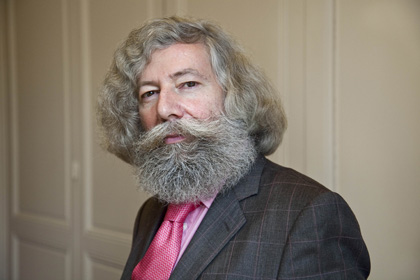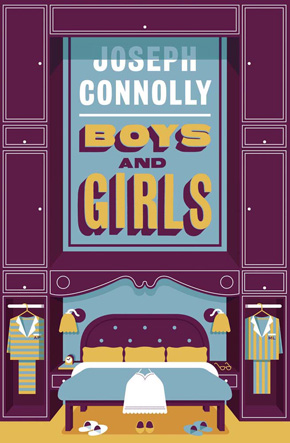Staying home
by Joseph ConnollyJoseph Connolly’s comic novels are always written as interior monologue, a writing technique he recently told the Guardian “just falls out of me… I sort of become the person when I am writing in their voice.” So how does he live from day to day deep within his writing chamber?
Where are you now?
At home, in Hampstead. I don’t really travel very much.
Where and when do you do most of your writing?
I do all of my writing at home – I have never written fiction anywhere else, and sometimes do wonder whether, if I did, its nature might be affected, for good or ill. As to when – mornings, and some afternoons. I continue until I feel myself straining: no point after that.
What is your pre-writing ritual?
I have a large cup of strong black freshly-ground coffee, and I do The Times cryptic crossword. And then I begin.
Full-time or part-time?
Full-time in the sense that I am a full-time professional writer with no other job (in theory; but there are always other jobs). But part-time in that there must be time for reading, leisure and eating out (I do a weekly restaurant review).
Pen or keyboard?
I write everything with a pen, including journalism. Then I amend it until it looks a horrible mess, when I transfer it to the screen, and re-edit it there. Even in the days of typewriters, I could never create on a keyboard.
How do you relax when writing?
I never want to relax when actually writing: one has to be in a state of high alert, and total absorption. Afterwards, however, is something else. Mind-numbing shoot-em-up films are good. Wine is good.
How would you pitch your latest book in up to 25 words?
Woman says to husband “I want another husband.” He is distraught. She clarifies: “I said I want another husband – not instead of, as well as.”
Who do you write for?
My readership. I have no time for authors who say “I write for myself.” People are spending their precious leisure time and leisure money on you: there is a duty to entertain, and be thought-provoking. Having said that, I always write what I want and need to: I have never ‘tailored’ anything for a particular market.
Who do you share a work in progress with?
Absolutely no one. I never read out bits, show bits… or even talk about it. It has to remain within. The first person to see a completed novel is my agent, and then my editor.
Which literary character do you wish you had created?
I am at one with Iris Murdoch in wishing I had created any character that people could actually name. Dickens managed dozens. I wouldn’t have minded having come up with James Bond. Or Jeeves. But on balance, I think I’ll happily settle for Sherlock Holmes.
Share with us your favourite line/s of dialogue, poetry or prose.
“So long as men can breathe, or eyes can see,
So long lives this, and this gives life to thee.”
William Shakespeare, ‘Shall I compare thee to a summer’s day?’ (Sonnet XVIII)
Which book do you wish you’d written?
One can only answer this rather glibly, as to have written a book, it must have been formed within you. But maybe Oliver Twist. Or Casino Royale. Or Lucky Jim…
Which book/s have you most recently read and enjoyed?
When I am writing a novel (which is usually) I can’t read fiction. So… the first volume of Mark Lewisohn’s monumental and definitive biography of The Beatles – of whom (obviously) I am a devotee.
What’s on your bedside table or e-reader?
There is not so much a bedside table as a waist-high double pile of books. Apart from the next non-fiction, there are always anthologies – the new Oxford book of humorous quotations is currently favourite.
Which books do you feel you ought to have read but haven’t yet?
I suppose Proust: I have only dabbled with it. Some people say it’s magnificent, others that it is full of long and boring bits: maybe what puts me off. And I should probably give Trollope another go: I didn’t get on with him before.
Which book/s do you treasure the most?
In the 1970s, I was collecting first editions of all the 1950s and 1960s novels, plays and poetry that I most enjoyed. No one else wanted them – and consequently my first book was called Collecting Modern First Editions. Now, all these authors – Amis, Murdoch, Golding, Pinter, Stoppard, Hughes, Fleming, Powell and many more – are very sought-after. They are my most treasured – not for their monetary value, but because I have fond memories of gathering them, and was seemingly the first to do so.
What is the last work you read in translation?
I don’t much. I like English literature: not even too much of a fan of American. So the last was maybe Dostoyevsky.
Which story collections would you particularly recommend?
Kiss, Kiss by Roald Dahl: truly good, and very surprising.
What will you read next?
Dominic Sandbrook and David Kynaston on the 1960s… in preparation for a novel I am planning.
What are you working on next?
I am in the final stages of a new novel (not the one referred to above, that comes next). Which can be confusing when you are promoting and discussing the one before…
Imagine you’re the host of a literary supper, who would your dinner guests be (living or dead, real or fictional)?
One wouldn’t want to cram in too many geniuses or brilliant conversationalists, because the result would be babel, envy, hatred and blood on the carpet. But Dickens, I think… Churchill… Muriel Spark… Ebenezer Scrooge… Kingsley Amis… Dorothy Parker… and Bertie Wooster.
If you weren’t writing you’d be…?
I once thought I might have been an actor. Or a commercial designer. But speaking of the here and now, if I were not writing… I’d be very bored, frustrated and broke.
Joseph Connolly is the author of twelve works of non-fiction and twelve novels, most recently Boys and Girls, a tumultuous examination of marriage, male bonding and interminable adolescence, published in hardback and eBook by Quercus. Quercus are also releasing all his backlist novels in striking new editions. Read more.
josephconnolly.co.uk



